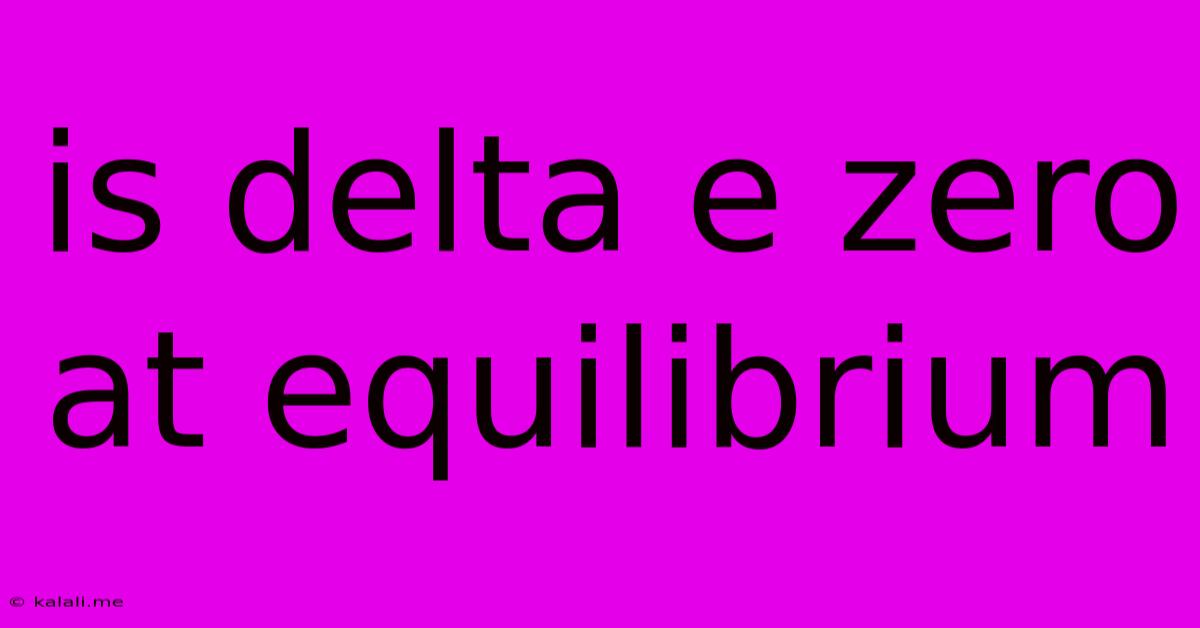Is Delta E Zero At Equilibrium
Kalali
May 23, 2025 · 3 min read

Table of Contents
Is Delta E Zero at Equilibrium? Understanding Gibbs Free Energy and Equilibrium
This article delves into the relationship between Gibbs Free Energy (ΔG), equilibrium, and the change in internal energy (ΔE). We'll explore whether ΔE is zero at equilibrium and clarify the misconceptions surrounding this concept. Understanding this is crucial for grasping fundamental thermodynamic principles.
Meta Description: This article clarifies the relationship between Gibbs Free Energy (ΔG), equilibrium, and internal energy (ΔE). We explore whether ΔE is zero at equilibrium and explain the relevant thermodynamic concepts.
What is Equilibrium?
Chemical equilibrium is a state where the rates of the forward and reverse reactions are equal, resulting in no net change in the concentrations of reactants and products. This doesn't mean the reactions stop; rather, they proceed at the same pace in both directions. Think of it like a perfectly balanced seesaw: the forces on each side are equal, preventing any movement.
Gibbs Free Energy (ΔG) and Equilibrium
The Gibbs Free Energy (ΔG) is a thermodynamic potential that measures the maximum reversible work that may be performed by a thermodynamic system at a constant temperature and pressure. It's a crucial indicator of the spontaneity of a reaction.
- ΔG < 0: The reaction is spontaneous in the forward direction.
- ΔG > 0: The reaction is non-spontaneous in the forward direction (spontaneous in the reverse direction).
- ΔG = 0: The reaction is at equilibrium.
At equilibrium, there's no further net change in the system's Gibbs Free Energy. This is the key point. The system is in a state of minimum free energy under the given conditions.
Internal Energy (ΔE) and Equilibrium: The Crucial Distinction
Here's where we address the core question: Is ΔE zero at equilibrium? The answer is no, not necessarily.
ΔE represents the change in the system's internal energy, encompassing the kinetic and potential energies of its molecules. While ΔG being zero at equilibrium signifies a balance between reactants and products, ΔE reflects the system's total energy content. This total energy might remain constant, increase, or decrease, even at equilibrium, depending on the nature of the reaction (endothermic or exothermic).
The Role of Enthalpy (ΔH) and Entropy (ΔS)
The Gibbs Free Energy is related to enthalpy (ΔH, heat content) and entropy (ΔS, disorder) by the following equation:
ΔG = ΔH - TΔS
Where T is the absolute temperature.
At equilibrium (ΔG = 0), the relationship between enthalpy and entropy dictates the system's overall energy. An exothermic reaction (ΔH < 0) might release heat, potentially increasing the surroundings' energy, while an endothermic reaction (ΔH > 0) might absorb heat, potentially decreasing the surroundings' energy. The entropy change (ΔS) further influences the equilibrium state.
Examples Illustrating ΔE at Equilibrium
Consider these scenarios:
- Exothermic reaction at equilibrium: The system releases heat to the surroundings (ΔH < 0), leading to a decrease in the system's internal energy (ΔE). However, ΔG = 0, signifying equilibrium.
- Endothermic reaction at equilibrium: The system absorbs heat from the surroundings (ΔH > 0), resulting in an increase in the system's internal energy (ΔE). Again, ΔG = 0 at equilibrium.
Conclusion: Equilibrium and Internal Energy
In summary, while the Gibbs Free Energy (ΔG) is zero at equilibrium, the change in internal energy (ΔE) is not necessarily zero. ΔE's value depends on the enthalpy and entropy changes of the reaction and doesn't directly define the equilibrium state. Understanding the distinction between ΔG and ΔE is fundamental to a comprehensive understanding of thermodynamics and chemical equilibrium.
Latest Posts
Latest Posts
-
The Same Catalyst Cannot Be Used In Different Reactions
May 23, 2025
-
How To Replace A Toilet Flange
May 23, 2025
-
How Do You Make Distilled Water
May 23, 2025
-
How To Get Rust Out Of Clothes
May 23, 2025
-
What Color Is Power Steering Fluid
May 23, 2025
Related Post
Thank you for visiting our website which covers about Is Delta E Zero At Equilibrium . We hope the information provided has been useful to you. Feel free to contact us if you have any questions or need further assistance. See you next time and don't miss to bookmark.